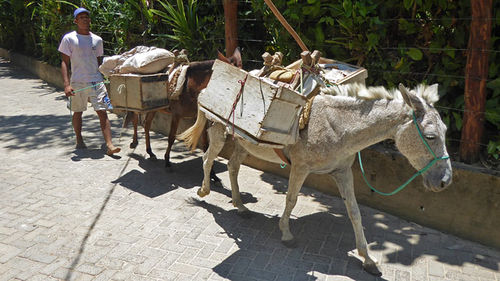Difference between revisions of "Donkey leather"
| (7 intermediate revisions by one user not shown) | |||
| Line 5: | Line 5: | ||
<p align=center> | <p align=center> | ||
| − | [[bild: | + | [[bild:Donkey Leather-01.jpg|500px]] |
</p> | </p> | ||
| − | + | Objects made from donkey leather are not known. Donkey skins are processed in China to produce gelatine, which is then used in the manufacture of traditional medicine. The Chinese call this raw material "ejiao" (also "colla corii asini" or "donkey hide glue"). | |
| − | + | Since keeping donkeys has declined in China, skins have been smuggled into the country. In 2015 1,200 donkey hides from Karachi in Pakistan were seized in Hong Kong and another 4,736 donkey hides in 2017 in Karachi. Exports were banned because donkeys were illegally slaughtered or poisoned and the skins and the meat were offered for sale with false declarations. | |
| − | 2016 | + | In 2016, several men were arrested in Botswana who illegally tried to sell donkey skins in Hong Kong and China. |
| + | |||
| + | It was estimated in 2017 that about 1 million donkey skins are traded every year, but the demand from China is more likely to be between 4 and 10 million [[hide|hides]]. | ||
| + | |||
| + | In 2019, the prognosis was that the population of donkeys worldwide will be reduced by another 50% by 2025. This is likely to lead to increased illegal slaughter, smuggling and fraud as the demand for ejiao remains high. | ||
| Line 19: | Line 23: | ||
<br> | <br> | ||
<p align=center> | <p align=center> | ||
| − | <flashow> | + | <flashow>//www.youtube.com/v/-tJtZmJCWLw&fs=1&color1=0x660000&color2=0x550000&border=1|width=500|height=281,25</flashow> |
</p> | </p> | ||
<p align=center> | <p align=center> | ||
''[[Exotic leather|Leather of different animal species - Exotic leather]]'' | ''[[Exotic leather|Leather of different animal species - Exotic leather]]'' | ||
</p> | </p> | ||
| − | |||
| − | |||
| − | |||
| Line 36: | Line 37: | ||
* [[Bird leather]] | * [[Bird leather]] | ||
* [[Bull testicles]] | * [[Bull testicles]] | ||
| − | * [[Alligator leather#Caiman leather - Caiman skin| | + | * [[Alligator leather#Caiman leather - Caiman skin|Caiman leather]] |
* [[Camel leather]] | * [[Camel leather]] | ||
* [[Carpincho leather]] | * [[Carpincho leather]] | ||
| Line 64: | Line 65: | ||
| − | == | + | ==Additional information== |
| − | * [[ | + | * [[Dorsal stripe]] |
Latest revision as of 19:27, 15 September 2022
Objects made from donkey leather are not known. Donkey skins are processed in China to produce gelatine, which is then used in the manufacture of traditional medicine. The Chinese call this raw material "ejiao" (also "colla corii asini" or "donkey hide glue").
Since keeping donkeys has declined in China, skins have been smuggled into the country. In 2015 1,200 donkey hides from Karachi in Pakistan were seized in Hong Kong and another 4,736 donkey hides in 2017 in Karachi. Exports were banned because donkeys were illegally slaughtered or poisoned and the skins and the meat were offered for sale with false declarations.
In 2016, several men were arrested in Botswana who illegally tried to sell donkey skins in Hong Kong and China.
It was estimated in 2017 that about 1 million donkey skins are traded every year, but the demand from China is more likely to be between 4 and 10 million hides.
In 2019, the prognosis was that the population of donkeys worldwide will be reduced by another 50% by 2025. This is likely to lead to increased illegal slaughter, smuggling and fraud as the demand for ejiao remains high.
Video about leather of different animal species
Leather of different animal species - Exotic leather
Other exotic leather
- Alligator leather
- Alpaca fur
- Antelope leather
- Armadillo leather
- Bird leather
- Bull testicles
- Caiman leather
- Camel leather
- Carpincho leather
- Cat fur
- Chicken leather
- Crocodile leather
- Dog leather
- Elephant leather
- Fish leather: Eel, shark, salmon, moray eel, stingray and many others
- Frog leather - Toad leather
- Giraffe leather
- Hippo Leather
- Horsehide - Horse leather
- Kangaroo leather
- Llama Fur
- Lizard leather
- Ostrich leather
- Pangolin leather
- Peccary leather
- Rumen leather
- Sealskin leather
- Snakeskin
- Turtle skin
- Walrus leather
- Yak leather
- Zebra hide
Additional information









 a kotori web solution
a kotori web solution